The Myers-Briggs® Personality Types who Conflict with Each Other
Do you ever feel like there are certain people who naturally rub you the wrong way? Maybe it feels like everything they say is a direct attack, or maybe you just have a feeling of unease when you’re around them. In today’s article we’re taking a look at “conflict pairs.” The original idea for this came from Socionics, but I’ve seen these conflict pairings cause fireworks and chaos in the Myers-Briggs® types as well.
Not sure what your personality type is? Try out our most highly recommended personality questionnaires:

- You can take our free personality questionnaire here
- You can take Personality Hacker’s highly accurate personality questionnaire.
- You can take the official Myers-Briggs Type Indicator® for $49.95
This article contains an affiliate link to a questionnaire on Personality Hacker. If you purchase one of their courses, I get a small kickback that I can use to pay for hosting and other demands of this site. I only recommend courses I love.
What Is the Theory of Conflict Pairs?
First off, I want to begin by saying that any person can get along with any other person. Individuals have many nuanced ways of showing up in the world and personality type isn’t the sole defining factor of relationship success. The more maturity two people have, the more they are likely to get along, even if they are a conflict pair. It just might take more work for them to see eye-to-eye than it would for another pairing.
Why Do Conflict Pairs Fight?
Conflict pairs value completely different cognitive functions. Cognitive functions are the mental processes that each personality type uses to absorb information and make decision.
Intuition is a type of cognitive function, for example. An extraverted intuitive (ENFP, ENTP, INFP, or INTP) looks to the world outside for ideas and possibilities. An introverted intuitive (INFJ, INTJ, ENFJ, or ENTJ) looks inside to notice patterns, insights, and hidden meanings.
Each personality type values four cognitive functions and gives less priority or value to four other cognitive functions!
According to Victor Gulenko, a Ph.D. who is widely considered the father of socionics, conflict pairings are disorienting, irritating, and tend to cause conflict.
“The degree of psychological compatibility in these relationships is the smallest, but this is not immediately apparent. The conflicter attracts rather than repels: he evokes admiration in his partner by the development of those traits of character that the other is weak in.” – Victor Gulenko, Psychological Types: Why Are People So Different?
As you can see, conflict pairings don’t always start off with big eruptions of anger and acrimony. Many times there’s mutual curiosity at first. However, over time the pair seems to struggle to find common language, disputes arise, and both may find themselves trying to prove something to their conflictor but to no avail.
Feel Too Complicated?
You don’t have to know all about type theory to understand this article. I don’t expect you to memorize every personality’s cognitive function stack or to understand the intricate ways each function may conflict with another.
The most important thing about this article is that it can help you understand why you have conflict. My hope is that what you find here can help you to have more empathy for the situations you find yourself in as well as empathy for the partner or friend who is “making your life hell”. Your conflictor isn’t necessarily out to make your life miserable (even if it may feel that way), they just have a completely different perspective brought about by different mental processes.
Who You’ll Have Conflict With, Based On Your Myers-Briggs® Personality Type
INFJ and ESTJ
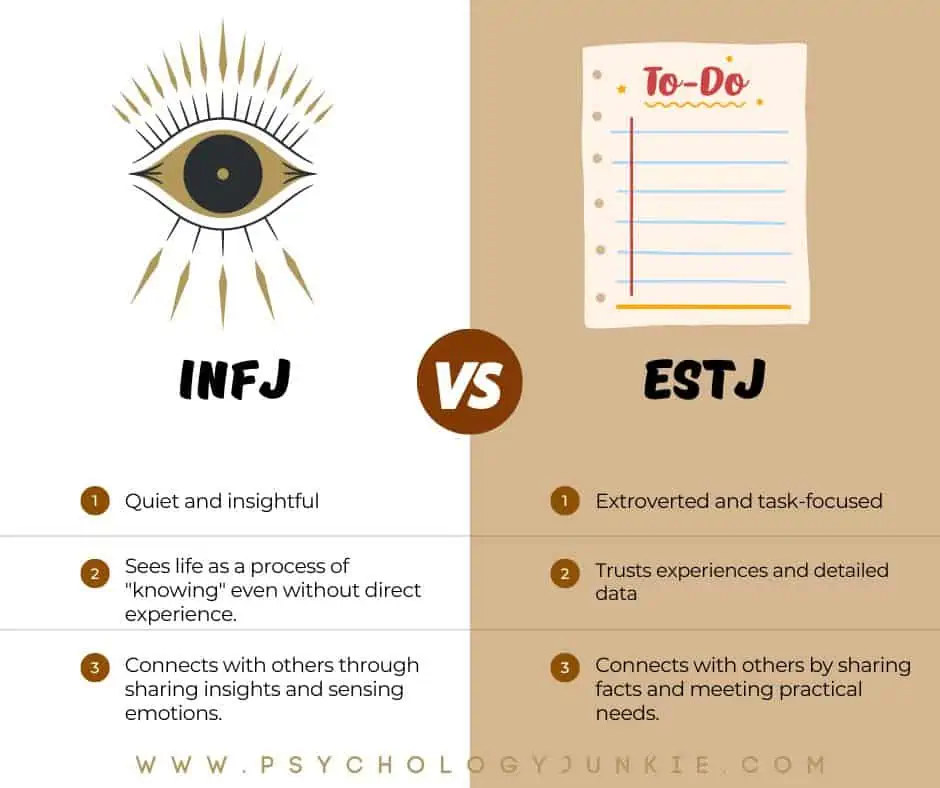
INFJs are dominant introverted intuitives. They see the world as an interconnected web of ideas and relationships, and they value harmony and tactful communication. Seeing the world for what it is can be dull to the INFJ. Rather, they focus on what it will be or could be. Often seen as mystical, they trust underlying meanings, clues, patterns, and intuitions.
For the INFJ, the important thing to focus on is the abstract more than the tangible. In relationships, they value harmony, mutual understanding, and gentle, tactful rapport. The best way to get along with an INFJ is to show empathy, insight, and patience.
ESTJs, on the other hand, are dominant extraverted thinkers. They value logical structure and rules that help create order in peoples’ lives. The ultimate pragmatists, they like to make decisions based on the facts at hand. What could be is less important than working with the present and relying on past experience.
ESTJs appreciate tangible results, clear communication, and directness. These types don’t beat around the bush and they hate anything that seems like a waste of time. The best way to get along with an ESTJ is to be direct, straightforward, and down-to-earth. It’s also important to mean what you say and say what you mean. Anything less than that seems manipulative.
Why INFJs and ESTJs Conflict:
INFJs and ESTJs see the world in fundamentally different ways. INFJs focus on the abstract while ESTJs focus on the literal. INFJs need ample time to process information and come to decisions while ESTJs make fast, quick decisions. ESTJs tend to be blunt and direct while INFJs are tactful and more conflict-avoidant.
To the INFJ, the ESTJ can seem like a bull in a china shop. Their direct, to-the-point form of communication can seem all too insensitive to the INFJ. And their need to move quickly and focus on the bottom line can seem pushy and domineering. ESTJs are all about practicality and action. INFJs believe in taking their time and looking carefully for patterns and insights.
Conversely, the INFJ can seem too slow and meandering to the ESTJ. Their indirect way of speaking can seem manipulative or insincere to the ESTJ. Furthermore, their focus on the abstract can seem too theoretical and out of touch with reality to the ESTJ.
INFJs may find themselves belittling the ESTJ without realizing it, and vice versa. They often misunderstand the others’ intentions and see their natural ways of doing things as personal attacks.
In short, the differences between these two types can often cause fiery debates that neither is likely to win. ESTJs are naturally skeptical of the INFJ’s intuitions, and INFJs are naturally suspicious of the ESTJ’s in-charge, by-the-books demeanor.
How can INFJs and ESTJs Get Along Better?
First off, learn about each other with an open mind. Understand that your conflictor’s personality is just that – their personality. It’s not bad, it’s just different. It may rub you the wrong way, but that doesn’t inherently mean it’s negative. In fact, your conflictor could help you to grow in ways that you are blind to without them. That said, working too closely together can result in conflicts if you aren’t careful.
So here are some tips:
- Focus on the positive as much as possible. What experiences have you shared that brought you both joy? Talk about those, commemorate them, remember them when things feel bad.
- Try to have a sense of humor with each other, but don’t let it get sarcastic or passive-aggressive. Joke around when you have differences, but do it in a way that’s respectful. Often humor creates a bridge for harmony and understanding.
- Realize that, while you may be suspicious of each other’s motives or perspectives, there’s value in the other person’s way of seeing things. Even if it seems odd or ridiculous to you, take some time to let the ideas sink in.
- Spend some time with people who are similar to you so that you don’t get too overwhelmed with someone who is always coming from a different angle.
- Be open to apologizing and forgiving. Chances are you will attribute wrong intentions to this person at some point or another or they will to you. Humility and open-mindedness go a long way.
- Discover values you both share and focus on those positives rather than the negatives.
- Find experiences you both enjoy doing together, even if it’s only a few.
Find Out More About INFJs: How INFJs Say “I Love You”
Find Out More About ESTJs: 24 Signs You’re an ESTJ, the Captain Personality Type
INTJ and ESFJ
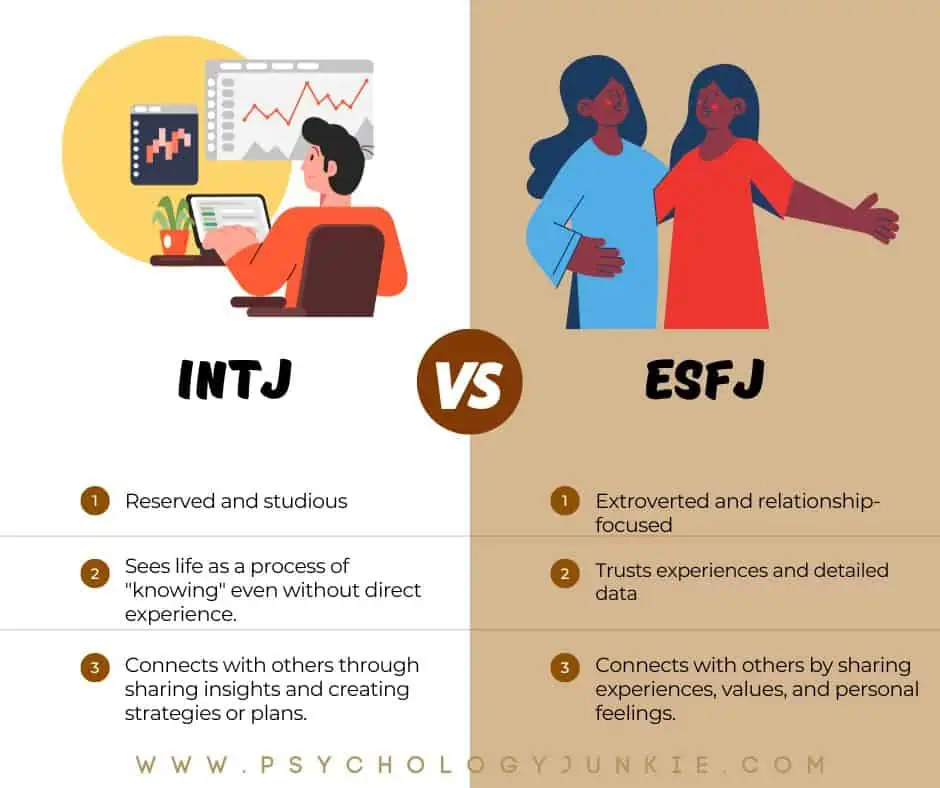
INTJs are dominant intuitives. They see the world as a puzzle to be solved and are constantly looking for patterns and connections. They peer through life with an openness to insights, intuitions, and ripple-effects. Private and independent, they are rely heavily on logic and careful strategizing. Meanwhile, ESFJs are focused on interpersonal relationships with a deep appreciation for tradition and practicality. They tend to be outgoing and friendly, with an eye for detail.
INTJs and ESFJs have different motivations and goals that can lead to conflict between the two types. INTJs are often highly independent and tend to focus on abstract ideas, while ESFJs are more focused on people and practical tasks. INTJs can be seen as needlessly stoic, hard to read, and difficult to please by the ESFJ. ESFJs can be seen as nosey, meddling, and manipulative to INTJs who are suspicious of the ESFJ’s more emotionally demonstrative nature.
INTJs enjoy a quiet life with very intentional interaction in the external world. When they do speak, they’ve put a lot of careful thought into what they’re going to say and don’t waste a lot of words. ESFJs use communication as a way to warm people up, inspire and motivate, and create an atmosphere of harmony and collaboration. The INTJ can look at the ESFJ’s more effusive way of communicating as overwhelming and prying. In contrast, the ESFJ can see the INTJ as too direct, insensitive, or even rude.
In a romantic relationship, these two can inadvertently walk all over the other person’s needs. The INTJ, more private about their feelings, keeps a lot to themselves and feels the strength of their affection lies in their actions. They dislike a lot of social engagements and don’t express their feelings in real time, rather inwardly sifting through them and later expressing them as thoughts. The ESFJ can view this as purposefully keeping them at arms’ length and not letting them in. ESFJs prefer to talk things out and don’t feel seen or heard when their partner doesn’t communicate with words—they may feel isolated, in the dark, and unsure how to be themselves in the relationship. At the same time, they may inadvertently overwhelm the INTJ who needs a lot of quiet and alone time.
How Can INTJs and ESFJs Get Along Better?
First off, it’s important to have an open mind when it comes to different personality types from your own. Neither are better or worse than the other, they’re just different and need to be respected as such. Neither, by virtue of their personality, are inherently smarter, kinder, wiser, or more important than the other.
Here are some tips:
- Talk openly about your goals, motivations, and expectations for relationships or friendships. If you set up some expectations early on, then situations won’t feel as needlessly abrasive or personal.
- If you have to work together on a task, separate duties based on your respective strengths. Try not to force the other person to adopt your style.
- Keep a sense of humor! A lot of misunderstandings can be cleared up by taking a lighter approach. Be patient, and provide feedback where necessary. Never use passive-aggressive or belittling humor with each other.
- Give each other space to be themselves. Even if you might find yourself shaking your head from time to time, it’s important to appreciate the individual.
- Focus on positive experiences you’ve shared together. Remember those when times are hard and try to revisit them to keep the relationship strong.
- Try to imagine the ways in which your conflictor’s perspectives are a strength rather than a weakness.
- Find experiences you both enjoy and make an effort to do those things together.
Find Out More About INTJs: The INTJ Cognitive Function Stack
Find Out More About ESFJs: 24 Signs That You’re an ESFJ, the Defender Personality Type
ENFJ and ISTJ
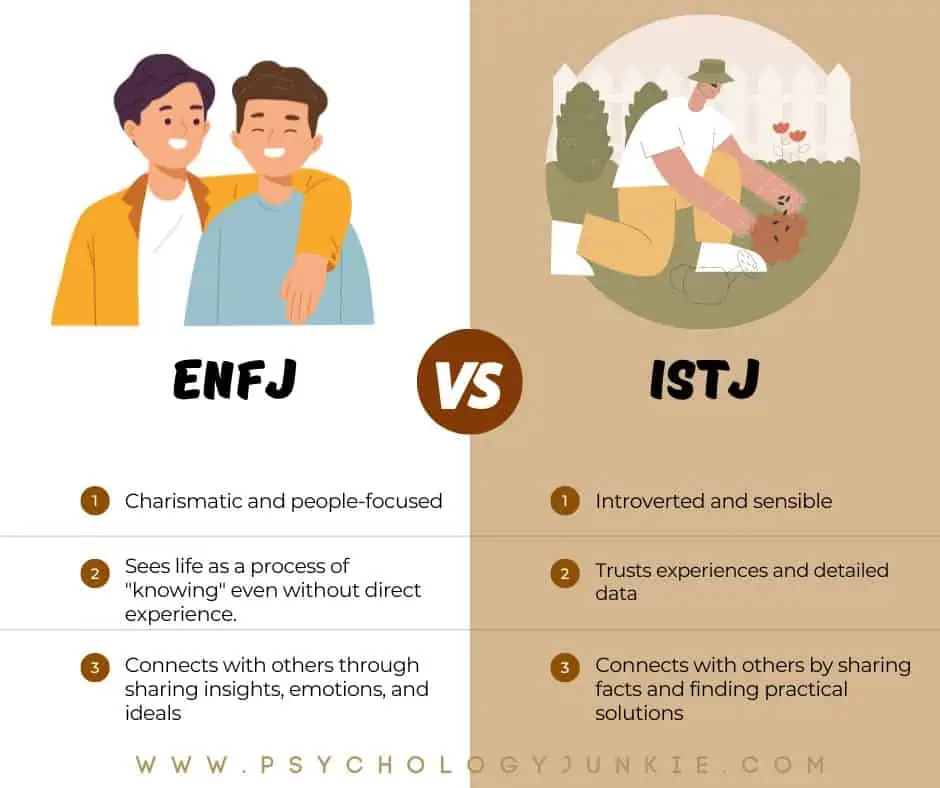
ENFJs believe in the richness and gravity of emotional experience. They empathize greatly with others and strive to create a feeling of harmony and emotional intensity. Emotions aren’t just transient feelings of the moment, but doorways into the profound, raw, beauty of life. Friendly and warm, ENFJs thrive in deep conversation about all manner of abstract, conceptual topics.
ISTJs are quiet, careful types who crave a life of stability and order. They’re extremely organized and structured, and like to map out their lives in order to create a sense of dependability for themselves and their loved ones. Deeply practical and logical thinkers, they value reason over emotion and are skeptical of intense feelings. The important thing for the ISTJ is to experience something first-hand rather than to dwell on concepts or abstract ideas that lack concrete meaning or personal experience.
ENFJs are at risk of seeing ISTJs as stuck up, stoic, and overly-traditional. They may try to warm up to the ISTJ only to feel rebuffed time and time again.
ISTJs struggle to maintain patience for the ENFJ’s abstract ideas, preferring to ground themselves in reality rather than exploring concepts with no “practical purpose”. They may also feel overwhelmed by the ENFJ’s emotional intensity.
ENFJs may feel bored with the ISTJ’s focus on the practical or day-to-day. ISTJs, in turn, may also find the ENFJ’s intense emotions uncomfortable and overbearing, leading them to distance themselves emotionally and physically.
The truth is that ENFJs excel in the world of ideas, and ISTJs excel in the world of the concrete. ENFJs need to have emotional interplay with people while ISTJs need to have privacy and space. Neither partner is better or worse than the other for simply being who they are.
How Can ENFJs and ISTJs Get Along Better?
It’s important for both ENFJs and ISTJs to understand and respect each other, with an emphasis on giving each partner the space they need in order to feel comfortable. Rather than shaking your head, making a passive-aggressive comment, or being condescending, take a breath to collect your thoughts. Is the other person expressing a “bad” perspective or opinion or is it just different from your own? How can you honor both your own and the other person’s way of existing in the world?
Here are some more tips:
- Give yourself an outlet to “vent” or unload pent up frustrations. Whether this means talking to a friend, punching a pillow, or writing in a journal, it’s important to have a way to get out frustration that is healthy.
- Remember that conflict doesn’t have to be adversarial and can actually lead to constructive conversations if approached in the right way.
- Focus on the good times you’ve shared together. Remember those when times are hard and try to revisit them, particularly if you are in a romantic or familial relationship.
- As Judgers, you both come from a place of externally voicing your decisions and opinions. The ENFJ will come from a place of interpersonal and emotional awareness. How will something make people feel? What do people need emotionally? How can we reach consensus? The ISTJ will come from a place of decided objectivity. What is accurate? What will achieve the end goal? What are the pros and cons? When making decisions, you may both voice very different opinions because you’re looking at different criteria. Try to see if you can have a meeting of the minds and find the good in each perspective.
- Try to maintain a sense of humor. This doesn’t mean that you must become a comedian! It just means that if tension arises, try to lighten up the situation with some laughter and without being patronizing or passive-aggressive.
- Find simple daily activities that you enjoy doing together, particularly if you’re in a romantic relationship.
Find Out More About ENFJs: 24 Signs That You’re an ENFJ, the Mentor Personality Type
Find Out More About ISTJs: 24 Signs That You’re an ISTJ, the Detective Personality Type
ENTJ and ISFJ
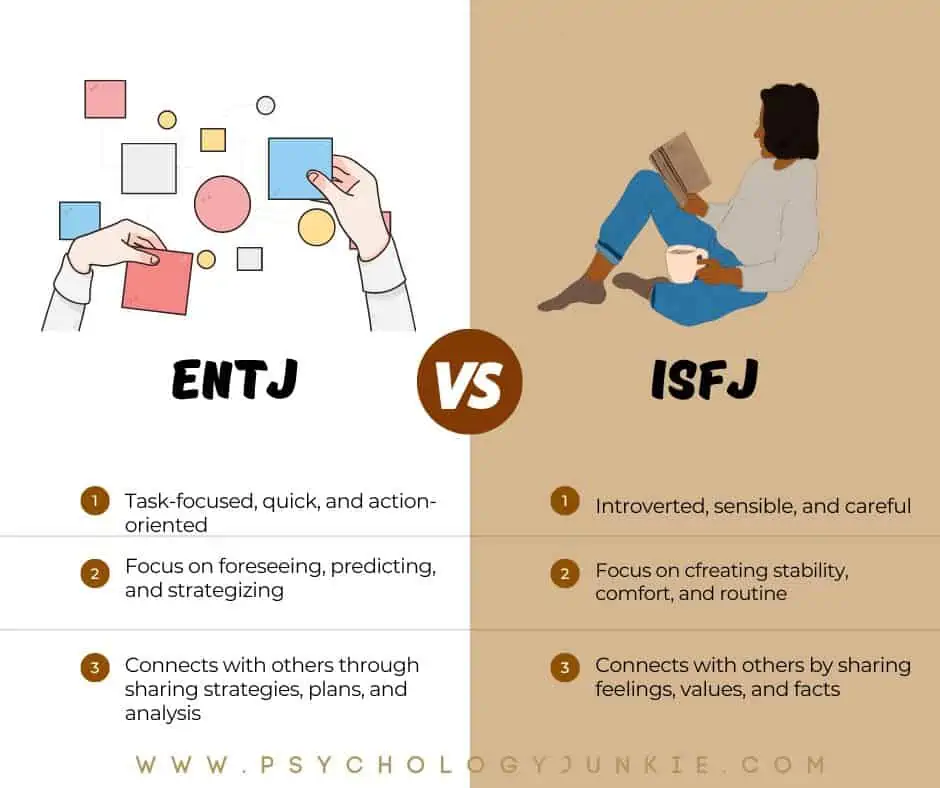
ENTJs are focused on efficiency and knowledge; they long to have mastery and to achieve long-term advances in whatever field they care about. Direct and straightforward, they have little patience for sugarcoating or beating around the bush. They have a job to do, and unless you’ve got something useful to bring to the table, they really would prefer you not waste their time on most occasions. That said, they will give their friends and families a high priority in their lives; often showing love through action and taking care of obligations and needs before they’re even asked.
ISFJs are tuned into the simple pleasures and details of life. They see the beauty in everyday routines, in nature, and in personal relationships. They are often drawn towards quiet and slow-paced activities, like reading a book or painting. Their nurturing personalities also make them excellent caregivers; they love to take care of people and often put others’ needs ahead of their own. Communication is gentle and tactful, and ISFJs enjoy using humor or shared values to draw closer to people.
When these two types meet, there may be an immediate curiosity mixed with some uncertainty. But they tend to conflict because their aims and perspectives are in completely different places. ISFJs are likely to see ENTJs as too brusque, domineering, or ambitious. They may feel like their visions are too far-fetched, their bottom-line approach too hard-hearted, or their drive too overwhelming. Meanwhile, ENTJs may find ISFJs to be overly sensitive and focused on the “mundane” details of life. They may feel like ISFJs aren’t ambitious or driven enough, or that they’re missing the bigger picture by focusing on comfort, coziness, and other peoples’ feelings. They may try to directly point out some ways the ISFJ could “optimize” their lives only to inadvertently offend the ISFJ.
How Can ENTJs and ISFJs Get Along Better?
- Focus on what is working between you and try to express the positive. This alone can help you work through many tough times.
- ENTJs in relationships with ISFJs should set aside time to just relax and “be” with their ISFJ partner – no agenda. In turn, ISFJs should try to set aside some time to listen to the ENTJ discuss their goals and their work.
- Remember that when you see differences, those differences may feel unsettling, but that doesn’t mean they are bad. For example, an ENTJ might feel like an ISFJs pace is “too” slow or their focus is “too” detailed. An ISFJ might think that an ENTJ is “too” direct or their pace is “too” quick. Try to remember that these differences aren’t naturally wrong and, unless they do become oppressive in some way, offer the other person the chance to be themselves without criticism or condescension.
- Develop outlets that inspire you and allow you to blow off some steam. Whether this is going to the gym, working on a hobby, or having dinner with friends – make sure you have time to do something that is solely for yourself.
- If you’re in a close relationship, take time to find shared values and hobbies. This way you’ll have activities to enjoy together or causes to work towards. Just make sure you each give the other the chance to pursue those interests in their own way – not your way.
- See your differences as “learning challenges” that can help you be more understanding or more aware of your blind spots. Reframing difficulties this way can make them easier to handle and less overwhelming.
- Finally, be willing to listen to the other person’s perspective without judgment or assuming you know best.
Find Out More About ENTJs: What ENTJs Do When They’re Stressed Out
Find Out More About ISFJs: 24 Signs That You’re an ISFJ, the Protector Personality Type
INFP and ESTP
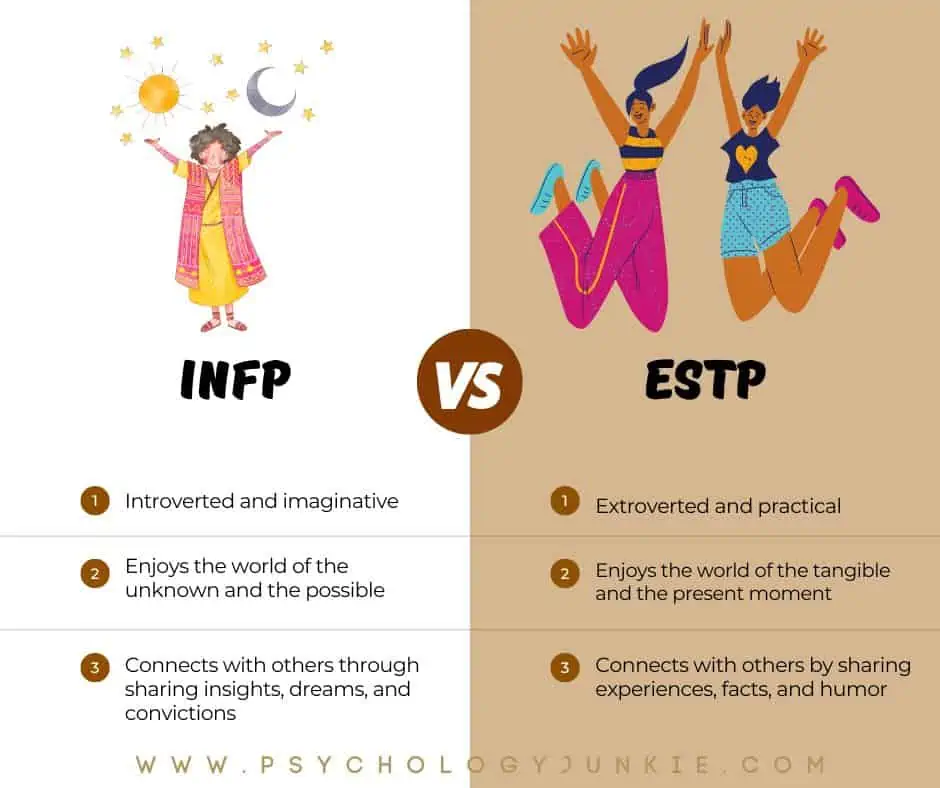
INFPs are the dreamers and idealists of the type community. These quiet and gentle personalities are often fascinated by ideas, connections, and the beauty of emotions. They value contemplation and deep conversations but may appear aloof to those who don’t understand them. Their authenticity and understanding nature make them excellent listeners; they are naturally drawn towards people with strong values and convictions.
ESTPs are called the “ultimate realists” and it’s not hard to see why. They value action, experience, and a fast-pace. They take on life with great enthusiasm and love a challenge — as long as it’s fun and interesting. ESTPs have an eye for opportunity, and they’re always looking for ways to move forward or make things happen in the moment. Rather than spend time in dreams or imagination, ESTPs are focused on immersing themselves in any type of physical experience or adventure.
When INFPs and ESTPs meet, there may be an instant connection as both personalities are driven by a passion for life. However, the differences between their two worldviews can lead to misunderstandings and conflicts. INFPs want to talk about ideas and convictions whereas ESTPs want to talk about tangible things or experiences. An INFP might be deeply moved by a story or movie and an ESTP will have fallen asleep because it was too slow. Overall, these two types are fundamentally attracted to very different experiences.
Over time, condescension and conflict can start to grow between these two types. INFPs may see ESTPs as too “shallow” or “hedonistic” because they don’t value the same kind of introspection and weighty subject matter as INFPs typically do. ESTPs may see INFPs as too “dreamy” or “sensitive” because they focus so much on abstract matters and are less interested in what’s tangible or real. They may also inadvertently offend INFPs with their more detached, matter-of-fact nature.
How can INFPs and ESTPs get along better?
It’s important for INFPs and ESTPs to recognize the other individuals’ strengths and to not simply see them as defects. For ESTPs, this can be achieved by developing an appreciation for the INFP’s imagination, creativity, or soul-searching nature. Even if you’re appreciating these qualities from a distance, recognizing the beauty in them is essential. For INFPs, this can be achieved by developing an appreciation for the practicality, adventurousness, and realism of the ESTP. In a crisis, these are the types you’d want on your team.
Here are some more tips:
- Look to each other for help in areas you’re naturally weak in. INFPs, if you want an objective perspective on an event (based on the facts at hand) talk to an ESTP. ESTPs, if you want to talk to someone who can offer an alternative, imaginative perspective on something, talk to an INFP.
- Both of you value autonomy. Give each other space, but then come back together for activities and experiences you both mutually love.
- Discover what your shared values are. INFPs and ESTPs can have different ways of expressing themselves, but they likely have some similar values that can draw them closer.
- Refrain from using extreme negative judgments on the other, simply because of how you interpret their natural preferences. INFPs, don’t call ESTPs “shallow” just because they’re focused on the present and opportunities in the immediate moment. ESTPs, don’t call INFPs “flaky” just because they’re more in tune with imagination.
- Use humor to deflate tense situations. Both of you are gifted with a quirky and often offbeat sense of humor. Use it and enjoy it!
Find Out More About INFPs: How INFPs Say “I Love You”
Find Out More About ESTPs: 10 Things You Should Never Say to an ESTP
INTPs and ESFPs
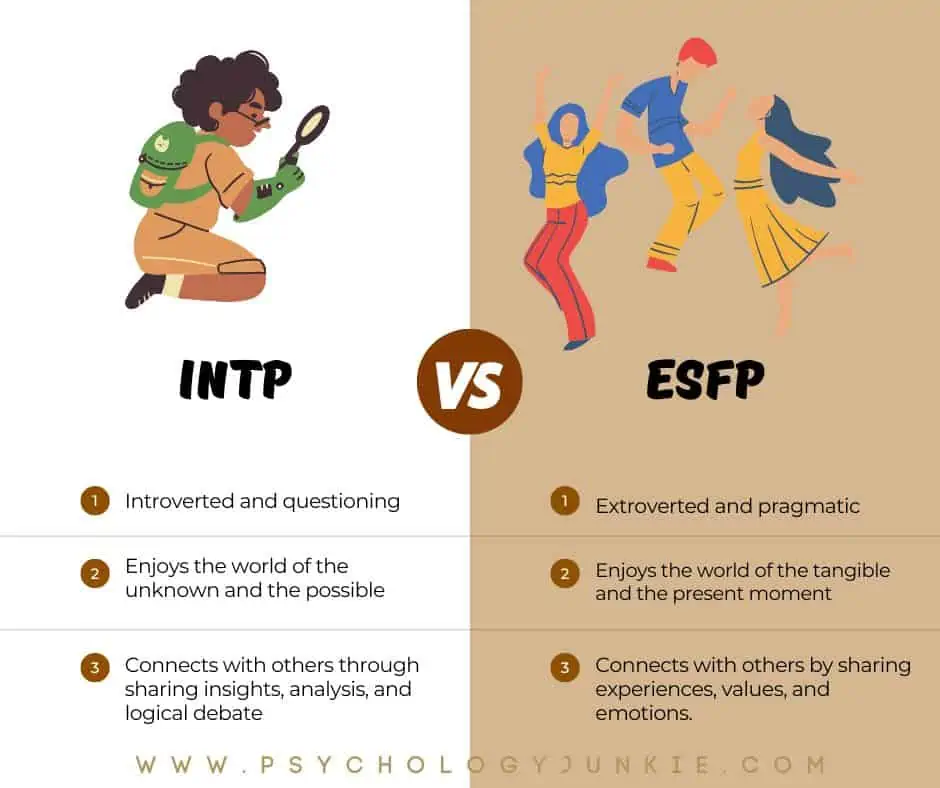
INTPs are the theorizers and troubleshooters you need when a complicated problem stumps you. Driven by curiosity, they are always searching for understanding — they want to know how things work (in the abstract sense) and why people do what they do. They easily notice inconsistencies and have an appreciation for elegant theories and models. Analyzing, learning, and questioning are activities that drive them.
ESFPs, on the other hand, are concrete thinkers who prefer to live in the present moment. They’re often seen as the life of the party, with a natural ability to connect with people and bring out liveliness and fun. SFPs take pleasure from being active, and they don’t mind taking risks or jumping into something without knowing all the facts first — as long as they know it will be worth their while.
These two types can find themselves in a conflict if left unchecked. INTPs may become frustrated when ESFPs don’t take the time to think through an issue, or when they “cut corners.” ESFPs may become exasperated by the INTP’s tendency to “overthink” things and ignore the more immediate, tangible possibilities.
How can INTPs and ESFPs get along better?
INTPs should learn to appreciate the ESFP’s ability to make something practical out of an idea or situation — their capacity for taking action in the present moment can help bring about results. ESFPs should learn to appreciate the INTP’s ability to take a seemingly chaotic situation and construct a “big picture” from it — their capacity for understanding the underlying principles can bring a level of clarity that is deeply enlightening.
Here are some more tips:
- Both types also need to recognize that they’re both important, and have something valuable to offer. It’s often easier said than done, but try to come together and understand your differences instead of clinging to a “right” or “wrong” perspective.
- Look for common interests that can bridge the gap between you. Maybe it’s a shared love of adventure, or a mutual appreciation for a certain type of comedy – whatever it is, spend time together doing activities that you both enjoy.
- Remember that it’s important to make sure everyone feels heard, and not just talked at. When communicating, take a moment before responding — it shows the other person that you value their opinion and have taken the time to consider what they said.
- Find the humor in your opposite viewpoints. Sometimes all you can do is laugh at the vast differences between your personality types.
- Respect each other’s needs and refrain from viewing them as “less than” your own. For example, INTPs can respect the ESFP’s need to learn from experience more than theoretical conversation. The ESFP can respect the INTP’s need for alone time and more abstract conversations.
- Find a way to blend your interests. You could talk about an abstract subject while hiking to satisfy the thinking side of the INTP and the sensing side of the ESFP. Find a shared value or cause that matters to you both and work towards it in your own respective ways.
Find Out More About INTPs: The INTP Cognitive Function Stack
Find Out More About ESFPs: ESFP Cognitive Function Guide
ENFPs and ISTPs
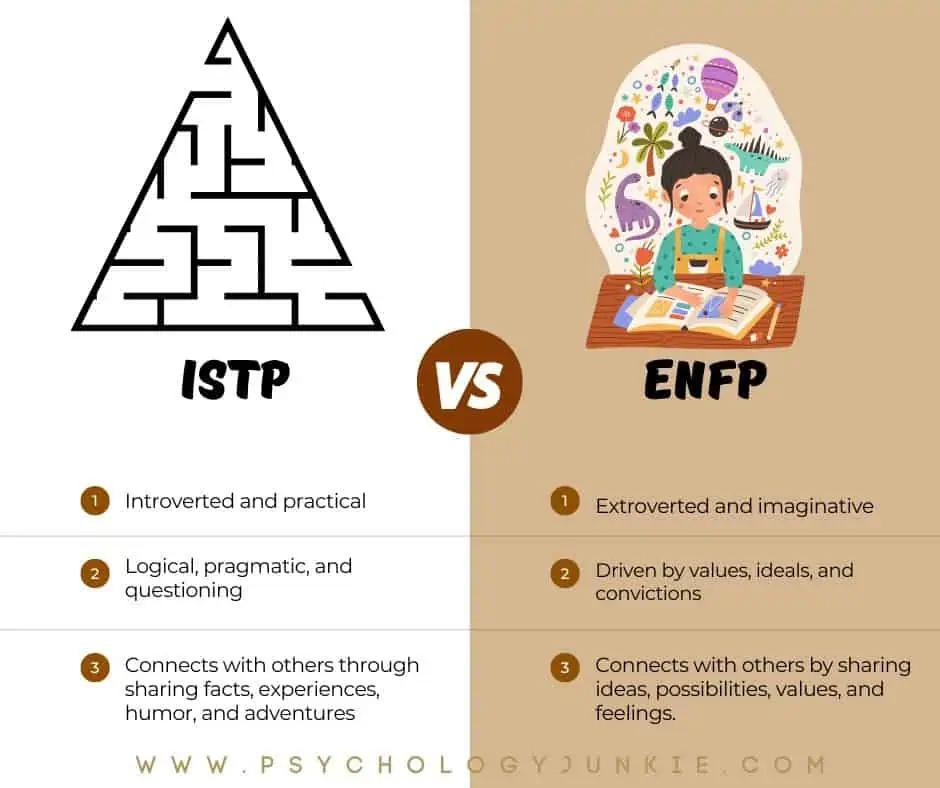
ENFPs are driven to grasp ideas and insights of profound significance. Perceptive and creative, they can see possibilities and interconnections everywhere. They have a knack for interpreting situations and picking up meanings and hidden motives.
ISTPs, on the other hand, prefer to focus on reality in the here and now. They make decisions based on what is immediately evident and work with facts more than abstract ideations. Analytical and pragmatic, they enjoy understanding how objects work and creatively using tools or resources to solve problems.
These two types can clash if they don’t take the time to understand each other’s way of thinking and communicating. ENFPs may become frustrated when ISTPs avoid conceptual conversations, while ISTPs may become exasperated by the ENFP’s tendency to take leaps of understanding without taking into account all the facts. Over time the ENFP can see the ISTP as “dull” or the ISTP can see the ENFP as “flighty.
ISTPs like a quiet life and lots of autonomy and freedom. They naturally critique new ideas to eliminate anything that doesn’t fit with a logical principle. This can be be difficult for the ENFP, whose creative thought process often wanders and and jumps from one point to another. ENFPs like bouncing ideas off of other people, generating more and more faster than the ISTP can critique them. In the end, the ISTP may shrug off the ENFP’s contributions as “too flaky” or the ENFP might dismiss the ISTP as “too critical.”
How can ENFPs and ISTPs get along better?
Realize that both of you have strengths in completely separate categories. We need brainstormers and idealists (ENFPs) and we need analyzers and hands-on innovators (ISTPs). Neither is better than another, but you both might naturally irk each other because of your different perspectives.
Take the time to understand each other’s points of view and try to re-frame your perspective from “these perspectives are wrong” to “these perspectives are simply seen through a different lens”
Here are some more tips:
- Talk about the topics that you both enjoy and find a way to combine and merge your interests. Practice being slow to call out perspectives that don’t align with your own.
- Spend time in activities that both of you like doing, such as reading books or playing sports outdoors.
- Make an effort to listen empathetically before responding.
- Find ways to laugh together. Laughter creates intimacy and friendship – if there are comedies you both enjoy or ways of bantering that are fun, dive into those modes of expression.
- Respect each other’s need for independence and autonomy from each other. It may be important for you, if you’re in a romantic relationship, to cultivate friendships outside of your relationship to satisfy each other’s individual needs.
- When you argue, practice looking at all the angles. First, consider the sensing-based facts of the situation. Then look at the intuitive possibilities and connections. Next, consider the logic of the situation, then the values and emotions involved. Over time, this will help you to make more balanced decisions and see the value in each other’s point of view.
Find Out More About ISTPs: 10 Things You Should Never Say to an ISTP
Find Out More About ENFPs: How to Communicate Effectively with an ENFP
ENTPs and ISFPs
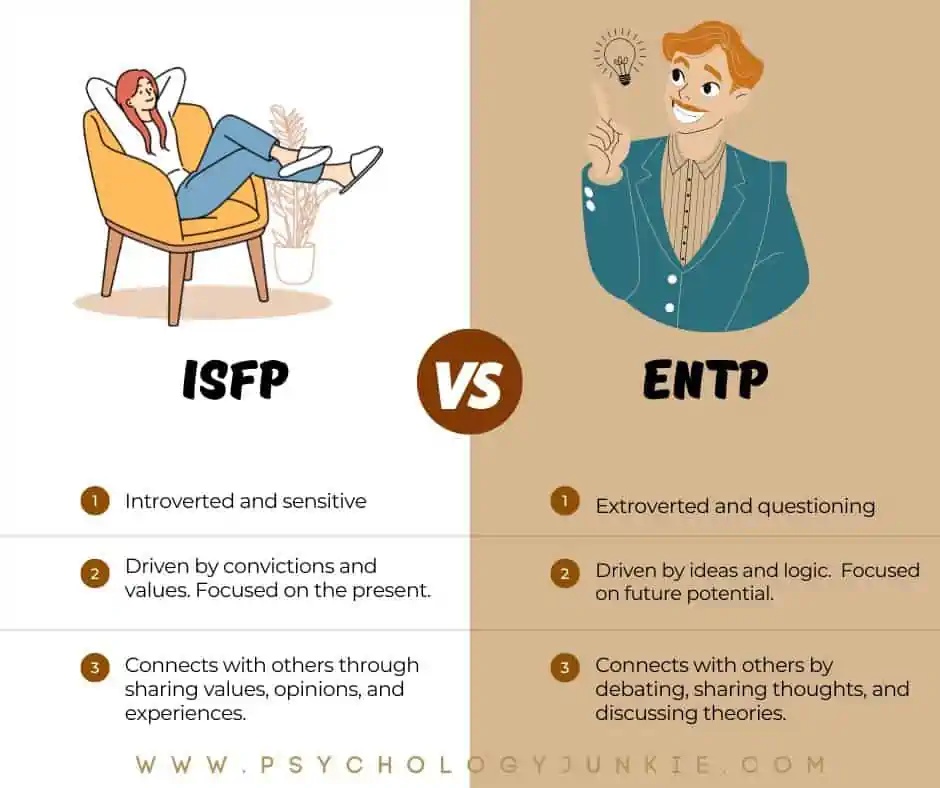
ENTPs and ISFPs have very different ways of approaching life. ENTPs are drawn to theories, ideas, and patterns while ISFPs are eager to experience the world firsthand. ENTPs move quickly from one idea or project to the next and enjoy a lot of banter, debate, and interaction. ISFPs prefer to take their time and are more quiet and reserved. When they do speak, they prefer to speak about what they know through experience, whereas ENTPs enjoy talking about ideas and hypothetical possibilities.
Contrary to the ENTP’s expansive, conceptual way of thinking, ISFPs are drawn to tangible details and experiences. They don’t enjoy being challenged or criticized for their feelings and will often become defensive in these situations. ENTPs can come off as harsh and unemotional when debating with the ISFP, which can cause hurt feelings. Both can feel that the other is hard to get through to and understand. They may feel more awkward, abrupt, and confused than normal in verbal interactions or when having to work together to finish a project.
How can ENTPs and ISFPs Get Along Better?
First off, know your communication styles. ENTPs should remember to take regular pauses and listen more when conversing with an ISFP. Listen with empathy in order to truly understand their viewpoint, rather than just waiting for a chance to interject with your own opinion. Likewise, ISFPs should keep an open mind and try not to shrug off the ENTP’s ideas as too “farfetched”. When debating, ground yourself in facts that you can both relate to in order to stay on track.
Here are some more tips:
- ENTPs, give ISFPs plenty of space. ISFPs don’t like a lot of prying and debating and need time to process their emotions. Don’t be too aggressive and recognize when the ISFP needs some time alone.
- ISFPs, find common ground with ENTPs. Even though you may not understand each other at first glance, there is usually something that can be found in which you both share a passion for. Try to recognize that their naturally analytical or debating nature isn’t directed at you as an “attack” in most situations.
- Even if your differences make you clash, recognize that you both have valuable perspectives and strengths that the world needs. Respectful banter and humor can actually help enhance relationships between opposites, as long as it’s kept light-hearted and humorous and not passive-aggressive.
- If you’re in a relationship, figure out the activities that you both mutually love. Prioritize these and make them a routine so that you can connect in a harmonious way.
- Approach each other with curiosity rather than judgment. Whenever you find yourself feeling critical or annoyed with each other, try to turn that into curiosity about the other’s alternate perspective. Ask questions to understand each other better and achieve more clarity.
Find Out More About ENTPs: The Flirting Style of the ENTP Personality Type
Find Out More About ISFPs: 10 Things You Should Never Say to an ISFP
What Are Your Thoughts?
Did you enjoy this article? The 16 personality types can easily have conflicts with each other due to their differences in communication styles, but these can be remedied with patience and understanding. What are some strategies you’ve used when in a personality-related conflict?
Share your thoughts below!
Find out more about your personality type in our eBooks, Discovering You: Unlocking the Power of Personality Type, The INFJ – Understanding the Mystic, The INTJ – Understanding the Strategist, and The INFP – Understanding the Dreamer. You can also connect with me via Facebook, Instagram, or Twitter!


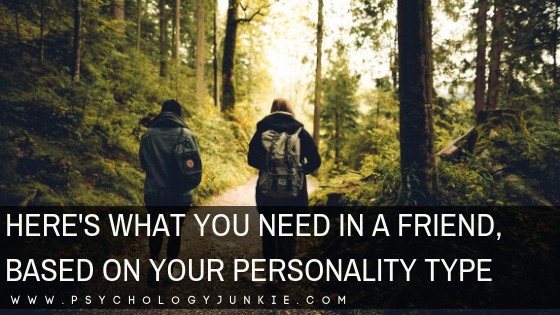
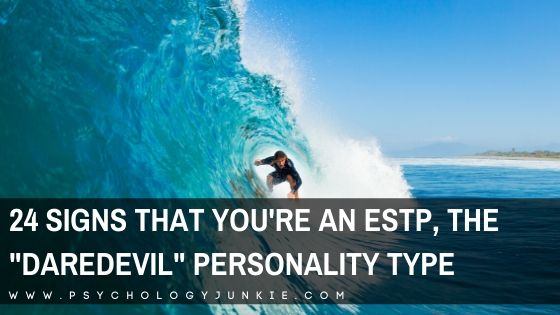


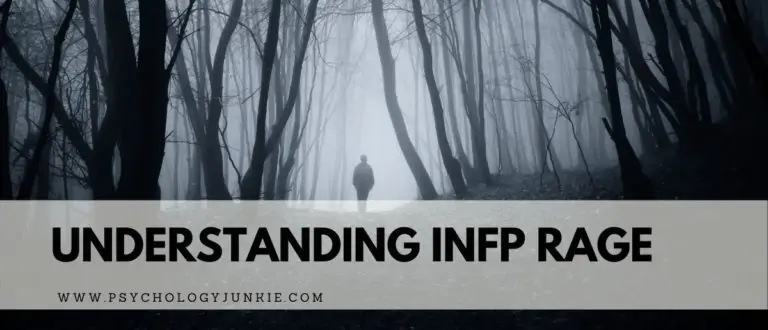

I’m an ISFP. My moot Court partner in law school was an ENTP, and we were school champions together. We really balanced each other’s weak points. We definitely had some conflicts though lol
I have a good friend that is (i think) an istp and I’m enfp.
I feel like we hang out all the time, but I don’t really “know” her that well, which is hard for my know-people-in-and-out kinda personality.
We have bonded over biking and snowboarding and playing sports…but sometimes I don’t have the energy for that and would rather just hang out in a more low key way somewhere and talk…but clearly “deep” convos make her quite uncomfortable…and sometimes I feel guilty for not getting as excited as she does abt the things she likes.
I love the adventurous things we do but I feel sort of trapped into them when that’s all we do…
We’re still rly good friends, but it just feels really tense sometimes…
Any advice…?
I think my boss must be an ESTJ. I am an INFJ, and lately, after many, many, years of working together, I am feeling worn out, weary and burned out by her. To all the other ESTJ qualities, add in grudge-holding, looking for offense and low self-esteem, poorly hidden by bravado. I’ve tried to help her to stop being so ready to get angry at people, stop calling everyone idiots and morons, and just stop looking for problems ALL THE TIME, but she doesn’t. I was at the point of looking for a new job. I’m glad I read this today, and I am going to look more into the ESTJ personality and see how to deal better with her.
I am a fraternal twin. I am INFJ-T and my brother is ESTJ-A!!
Our communication is so difficult! He is very assertive…he is also a cop (perfect for ESTJ’s authoritative manner). I am a flight attendant and health enthusiast and I enjoy helping others.
In communicating with my brother I ALWAYS feel as if he is a detective looking to punch holes in my observations and opinions on things.
He wants to rush me through stories or explanations.
I get so mentally and emotionally drained trying to communicate with him so I will end up just walking away feeling angry and frustrated and I WILL retreat and just avoid him!!
I love my brother and he’s ALWAYS been so good to me and my kids …very generous and practical with his gifts! I will ALWAYS appreciate his practical advice and giving!! However, it seems that even the most superficial small talk (I HATE small talk) conversations can go sideways with him!!
As I get older I am much less patient in being rushed through my conversations so I will go back at him!! However, as a rule I am conflict avoidant and tend to go for long periods not initiating conversation with him and I think that he believes that I don’t care about him?
I love him, but I love him from a distance as my nervous system is tired now from always feeling like I must be ready to into a defense position which I do not have any interest in doing!
I understand but I’m sure it isn’t his intention to attack you and your points of view and to push you? Did you try talking with him and telling him you feel that way? And did you try listening to gis response? You can ask him to be more considerate and to hold himself whenever he wants to rush you through your stories and also try to understand he doesn’t want to be detective correcting you but probably only wants to help.
Also I have to point this out, as you are -T and not -A (assertive) it’s probably more fault in you then him for that miscommunication. You should work in yourself to be more assertive and learn to ask for what you want openly, and not running from “conflict”. Not every conversation or disagreement is conflict.
What about ENTJ VS. INFP?
I am an ENTJ and I don’t mind INFPs nearly as much as ISFPs. I find INFPs to be considerate and thoughful. The SF combo actually irks me a bit which can be both very sensitive and also lacking insight.
I’d have to second this… I’m an ISFP and I seem to have the most trouble working with ENTJ’s. I’ve never been known for lacking insight though. Hmm. On one hand I appreciate ENTJ decisiveness (something I struggle with). I tend to lead with concensus and compromise over efficiency. It’s not as productive at first glance, but people are more loyal and creative when they feel valued.
I have a harder time with ESTJ’s than ISTJ’s… -ENFJ
I think this is true too!
My husband is an ENFJ (also named James) and he DEFINITELY struggles more with ESTJs than ISTJs. We have found that ESTJs “push themsleves” and their opinions/beliefs on others more than ISTJs and that is the part that gets him. The lack of consideration for how they’re making others feel.
I’ve always thought and had to check that information on Russian sites that, according to Gulenko, conflictors are NOT as stated in your article. They don’t share a single letter, like P or J. So, a conflictor to an INFP is not an ESTP, but a ESTJ. On the contrary, an ESTP is a dual to an INFP
Conflictors -https://socioniks.net/article/?id=99
Relations – https://socioniks.net/relation/
and
https://socioniks.net/table/
Hi Elnara!
The reason for this is that in socionics INFPs ARE INFJs. The J/P on introverts is the opposite in socionics. This is because in socionics they determine J/P by going off whether the type has a dominant perceiving or judging function. For example, INFPs (in Myers-Briggs) have a dominant judging function (introverted feeling) so they would be INFJ in socionics, not INFP. Myers-Briggs gives out the J/P dependent on which extraverted function is judging or perceiving, so because the INFP’s first extraverted function is intuition (a perceiving function) Myers-Briggs labels them as perceivers. You can also see a thread on this on Reddit here: https://www.reddit.com/r/Socionics/comments/3vv04v/why_are_j_and_p_switched_for_introverts/
My mum’s an ESTJ and I’m an INFJ…
As an INTP I almost expected to see “INTP vs….everybody”! I do get along with people as much as I can for my part, but it seems so often that I’m misunderstood or just live in a different universe from everyone else. I’ve learned to handle sanguine-types like ESFPs (“trust but verify!”), but most of my conflicts have been with (I suspect) ENTJs/ESTJs as I have yet to meet one mature enough to have practiced introspection or considered how his/her demeanor, short temper, rudeness, condescension etc. affects others. I agree that in theory any two types should be able to get along and work together, but cooperation is a two-way street.
I’m female ESTP and once was in a relationship with INFP boy. This article shows exactly why we didn’t work out!
It’s so true we were attracted to one another immediately (we met through messages), we had so many topics and conversation was never ending, either by texts or bu talking on the phone. We talked for hours every night instead of sleeping. But once we met, I noticed I don’t like him THAT much anymore because he was too slow for me. He didn’t kiss me or anything even though every guy would by the signs I was giving. I had to ask him why and then he finally did it, saying he “didn’t know if I was ready”. Really?? Very strange for me but I brushed it off because attraction was still very strong. Even though I told him then that I was more then ready and explained signs I was giving, he learned nothing from that experience and continued to be hesitant about every next step in physical sense. He always wanted me to sleep in his house and I did multiple times but yet we never had s*x, again because his hesitation. Very very strange.
Then after some time more and more problems started to arise, I was always open for resolving then directly and openly but he wasn’t, he wanted me to read his mind. Even though I kindly asked him if x and y was problem (without embarrassing him) he didn’t want to tell me! He was behaving like a child and worse! I never met grown up man who is more childish than he is, and he was 39 yo. He didn’t want to break up (I literally had to ask him) but he also didn’t want to continue and when I pointed it out he just said “I don’t know”. Like wtf. That happened couple of times and then it was over somehow, even though he never wanted to say it or admit it.
Overall and after everything I concluded he is very weak and insecure man.
He reached to me after some time and I got impression he would want to try again, but I was definitely done with his nonsense by that time.